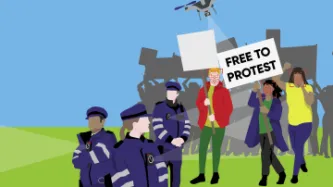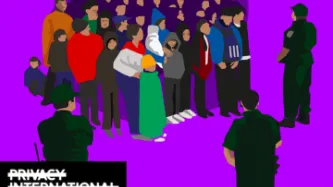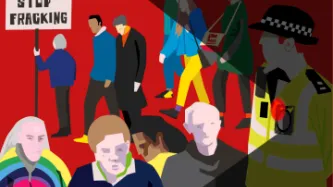Search Taxonomy Terms
Privacy International intervened in a landmark case brought in the UK courts by asylum seekers against mobile phone seizures and data extraction. Judgment was handed down on 25 March 2022. The High Court found that the secret and blanket policy of the UK Home Office to seize and search migrants' phones breached Article 8 ECHR and data protection laws.
We all need to understand the range of surveillance tools that police forces around the world can use to monitor and identify you if you attend a protest, and how you can better protect yourself from protest surveillance. Our partners and us have devised guides to educate people on the surveillance capacities police forces across the globe can use.
PI, together with Article19 and EFF intervened to outline how unrestricted surveillance of communications data interferences with the right to privacy and threatens freedom of expression.
In March 2021 Privacy International intervened in a case in the European Court of Human Rights which challenges the use of social media intelligence by governmental agencies.
Human rights defenders are continuously at risk of violence, intimidation and surveillance as a direct consequence of the work they do, with women or those opposing large corporations bearing the brunt of these forms of repression.
Privacy International spoke to four activists based in Colombia, Indonesia, Mexico and South Africa to learn more about their understanding and experiences of surveillance. Their testimonies illustrate how the promises that came with innovation and the use of new technologies have not been enjoyed by all equally, and how some groups in society - such as human rights defenders - have experienced the impact of surveillance and the exploitation of data by governments and companies more severely than others.
Below is an outline of the main issues that these four activists brought to our attention which reflect the concerns raised previously by other organisations and HRDs across the world.
The Home Office is currently developing a UK-wide police 'super-database' containing a vast amount of data, which mixes both evidential and intelligence material. Here is why PI is concerned about LEDS and what we are doing about it.
Our data stored in the cloud is increasingly sought after by law enforcement agencies. Increasingly, it is obtained using ‘cloud extraction technologies’.
Powerful countries encourage and enable other governments to deploy advanced surveillance capabilities without adequate safeguards.
Increasingly counter-terrorism strategies and policies are decided at the international level, most notably by the UN Security Council, and are used to erode human rights, with no accountability.
From facial recognition to social media monitoring, from remote hacking to the use of mobile surveillance equipment called 'IMSI catchers', UK police forces are using an ever-expanding array of surveillance tools to spy on us as we go about our everyday lives.








![White House (Pete Souza) Maison Blanche (Pete Souza) [Public domain]](/sites/default/files/styles/teaser_small_x1/public/2020-02/White%20House%20%28Pete%20Souza%29%20%20%20Maison%20Blanche%20%20%28Pete%20Souza%29%20%5BPublic%20domain%5D.jpg.webp?itok=_CifTyeV)
